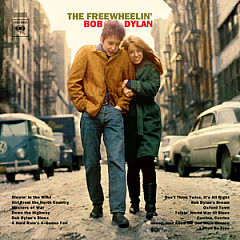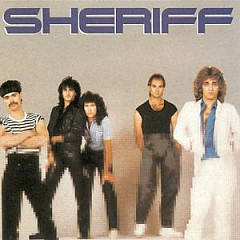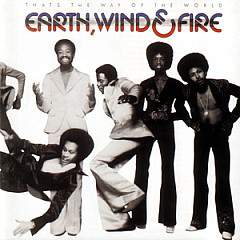Emily and her musical partner Amy Ray have been recording since high school, back when they called their act Saliers and Ray. By 1985, they were using the much more intriguing appellation Indigo Girls, and that year they issued "Crazy Game," an independent single that was followed by a full-length album. They quickly built a fervent following that gave them bargaining power when Epic Records came calling. Signed to the label in 1988, they used their creative control to make meaningful music sung in their distinctive harmonies, with Amy's alto complementing Emily's soprano.
Here, Emily charts her journey through some of those Indigo Girls songs, and explains how their unique songwriting arrangement works.
 Carl Wiser (Songfacts): I'd love to start with "Closer To Fine."
Carl Wiser (Songfacts): I'd love to start with "Closer To Fine."Emily Saliers: Okay.
Songfacts: Now, that song, I'm wondering if it's based on real experiences.
Saliers: It is based on real experiences. I mean, all of my songs, they're a combination of real experiences and what I observe through other peoples' behavior and experience. So that song, I was with my family in Vermont, and we were sitting in this, like, rustic cabin, and I was sitting on a front porch and looking out into the trees, which, you know, whenever you're such a bucolic setting, it can make you feel very philosophical.
So that's how I was feeling. And that song is about not beating yourself up too hard to get your answer from one place. There's no panacea, that in order to be balanced or feel closer to fine it's okay to draw from this or to draw from that, to draw from a bunch of different sources. So it's about being confused but looking for the answers, and in the end knowing that you're going to be fine. No seeking just one definitive answer.
Songfacts: Was there really a doctor of philosophy? Was that based on a real person?
Saliers: No, it's sort of a type. Like a stereotype. And I remember in high school one of my teachers had a poster of Rasputin on his door. You know, and his pictures just looked so bizarre to me, and always struck me. And I sort of put those images together, and it was sort of a poke at academia and the way it can sometimes be removed from reality. So I was saying I don't think this professor has the right to judge me in terms of real life, when we're caught up in this insular, sort of strange academic world. So that was sort of a comment about that.
Songfacts: And the bar at 3 a.m., did that actually happen?
Songfacts: So, in the song "Galileo," I have this image of you having one of your favorite beverages with a conversation with someone, and I was wondering what the real story is.
Saliers: Well, I was talking with my friend about reincarnation. What we believe, you know, does it mean that you come back as a dog or a tree or whatever, another human being, and the exchange of souls and all that stuff. And that just got me thinking about it. And I wanted to write a song that was upbeat, that sort of took the whole subject sort of in a lighthearted way, even though I was thinking about it very seriously.
There's this one point in the song where, as I understood reincarnation, you know it's a regeneration of souls for the betterment of all creatures and things over time. And I was thinking, you know, I'm so far from being the perfect soul that I should be that at least the world isn't going to experience nuclear holocaust while I'm alive, because I have to have my soul be regenerated at least once. So it was kind of like taking a heavy subject and sort of having fun with it.
Songfacts: So we would keep improving on ourselves every time we reincarnate.
Saliers: That's the way I understood it back then. I don't know if I believe in the exchange of souls, but I'm not a firm believer in, like, reincarnation, and that I'm going to come back and be a dog, or another creature. I have a different belief system now. But back then, my friend really believed that we come back as something else. And it is a regeneration of souls until we reach Nirvana.
Songfacts: Where does Galileo fit in this whole thing?
Songfacts: And I take it you really do have motion sickness?
Saliers: Not really. In a rocky boat I would, but I could travel in the car, backseat in a car. I can't read in a car, backseat. But the fear of motion was mostly about the fear of speed. Like, I do not like flying, although I do it all the time. I'm used to it now. But there was a time when I hated it. And I don't like skiing, I don't like things that take me downhill fast. So that's what motion means.
Songfacts: Okay, so that's that motion.
Saliers: Yeah. If reincarnation were true, then this guy who crashed his plane in the ocean a generation ago, or whatever, and came into my soul, that's why I have that, and I still have to work on that. That's what that was about.
Songfacts: You have a great hook in the song "Least Complicated," where you say, "the hardest to learn was the least complicated." Which is terrific. Can you tell me a little bit about that song?
Saliers: Well, I wrote that song actually sitting two stories above. I was in my house, I remember it very clearly, and I was looking down onto the street, and there were like these two… this boy and this girl, or young man and woman. I forget how old they were, exactly. But they were just holding hands and walking down the street. And I was going through some personal love crisis at the time, I can't even remember what it was. And I just started thinking, I don't want to be cynical at this young age, but I looked down at them, and it looks so easy, and I was just like, you just wait – wait. Because what human beings do is repeat their patterns, oftentimes.
And I used a lot of the school metaphor, like buying a ring. I bought my seventh-grade boyfriend a ring. That's a true story. So the part about not being cool... like girls weren't supposed to buy boys rings, but that's what I did. And I just thought back to my school days. And it's about lessons learned. That's where the image of the school days came in. And the fact that truly, if we could live our lives so much more simply in principle and not repeat the same mistakes, then we'd be happy. But it's so hard to do – at least for me.
Songfacts: Did you give him the ring?
Saliers: I gave him the ring, yep.
Songfacts: How'd that go?
Saliers: He was pretty gracious about it. I think he was taken aback, actually. I bought it at Woolworth's. It was a really cheap, like, high-school-looking ring with a red fake stone. It was awful.
Songfacts: That's a big deal in seventh grade, though.
Saliers: I know, I liked him so much. But that relationship didn't last past seventh grade, so it's okay.
Songfacts: So your new album, you have the song "Pendulum Swinger." Now, this one… maybe it's very obvious to many people, but I have not figured this one out yet. Would you be able to tell me about it?
Saliers: Definitely. It's a little bit of a purging. It takes on more than one big issue. It takes on the patriarchy in the church, and the squelching of women's voices in power within organized religion. I have a friend who works in the religious life, and we have lunch together and coffee all the time, and talk about all this stuff.
So that first line, "I meet you for coffee, we get together," that's true. That's about me and my friend. And we talk about all these issues. And she's a very powerful woman with a great vision for the way life can be, and she works a lot of with interfaith stuff. The language of organized religion so often is so male-oriented, the male pronouns, and its father God and son Jesus, and it's all male, male, male. So part of that song is about I miss the goddess. I miss the balance of the female/male spirits both together.
And then it talks about the Bush Administration and his macho posturing, and the bull-whip and the gunslingers and all that, like hawks, war hawks. And my belief is that we have to come from a place of love in order to heal the world. So in order for the pendulum to swing back the other way, away from war and violence and death and desecration, is to come from a place of love. That's why I said that the epicenter love is the pendulum swinger.
Songfacts: You come from a bit of a religious background, right?
Saliers: Yes.
Songfacts: Can you tell me about that?
Saliers: Yep. My dad is a ordained Methodist minister. He's actually a professor of theology, that's his vocation. So he teaches about Christian worship and literature and scripture. He and I actually wrote a book last year about the crossover between so-called secular and sacred music, and how music augments our lives, and how church musicians can start out as jazz musicians, and funk musicians can start out as church musicians, and how music is just this great life force, and whether you're in a bar with a bunch of people changing lives, or whether you're in a church service changing lives, that's the power of music, and it can't be broken down.
Songfacts: It must be really interesting being around your dad like that.
 Saliers: Yeah, he's just such a cool guy. Because, I mean, he's very Christian, and you know, he's a man of deep faith, but he's not judgmental. He's very open-minded and progressive. And he knows a daughter like me, who's sort of a religious mutt and still out there sort of searching, he's very, very patient with my questions, and we had a great experience writing that book together. It was basically sitting around endless cups of coffee and just talking about music. My dad went to Yale, and he was there during William Stone-Coffin's days, so it was a very progressive atmosphere where he was schooled. And it's great to just sit around and talk about that stuff.
Saliers: Yeah, he's just such a cool guy. Because, I mean, he's very Christian, and you know, he's a man of deep faith, but he's not judgmental. He's very open-minded and progressive. And he knows a daughter like me, who's sort of a religious mutt and still out there sort of searching, he's very, very patient with my questions, and we had a great experience writing that book together. It was basically sitting around endless cups of coffee and just talking about music. My dad went to Yale, and he was there during William Stone-Coffin's days, so it was a very progressive atmosphere where he was schooled. And it's great to just sit around and talk about that stuff.Songfacts: So when did the "Despite Our Differences" line become the title for the album.
Saliers: We had a really hard time naming this record, the hardest one. And Amy was just looking through lyrics, and she landed on that line. You know, it comes from a love song, but it's meant to point to the fact that while she and I are very different for obvious reasons, we've been able to maintain this career and friendship for 20+ years, and also in a global context how we can, despite our differences as peoples, or cultures, or countries, or whatever it is, we can co-exist without destroying each other. So that's the hope and that's the belief. And finally we just settled on that line.
Songfacts: When you said it comes from a love song, can you elaborate?
Saliers: It comes from the song "I Believe In Love," and that's just a song about personal struggle and relationship, and how you can make it work in the end, and just believing in the power of love despite the complexities of life that try to pull it apart.
Songfacts: Okay. And that's what I was going to ask you about next. If you could tell me a little bit about that one.
Saliers: Well, it's the first song I've ever written on ukulele, and I think sometimes the instrument you pick up can guide what kind of song comes out. I'm not going to write a rock song on ukulele, obviously, so the core progression felt sweet, and I always have sort of like a collective pool of thought up there somewhere, or things that I've written down. And the core progression just led me, for whatever reason, to just think about relationships, and using images of birds in the trees and what that portends, and the image of coffee growing cold in a cup to represent things growing stale or old or not vibrant. And then also explaining what happens, like over time how separation happens, but at the core of every strong relationship is the friendship. And the love. And when you strip everything away, all the complexities, that's what you have, and that's what I believe in.
Songfacts: Okay, so this is not about one specific person?
Saliers: No, it's just like it's reflections on love and relationship.
Songfacts: Along the same wavelength there, how about the song "Last Tears."
Saliers: "Last Tears" actually started as two different songs. And I put them together to become the chorus and the verse. And it's sort of a self-affirming song for someone who's gone through a difficult relationship, possibly a breakup, and comes to the point where it's like, okay, we went through this, I have no regrets at all about it, but I'm not going to cry anymore. It's time to move on. So it sort of takes into account everything that happened before, and then reaching this sort of epiphany where, you know, it uses the metaphor of getting drunk on sadness. And then when you've reached that point of sadness, then it's time to make the coffee, and give thanks for time that heals, and believe in moving on. And that's the end of the tears for that.
Songfacts: Do you think that's possible to just go and have just that one last good cry, and then move on from that?
Saliers: I think it is possible. Yeah, I do. I think that people can shift, and things can shift, and we can find perspective, and I believe that pain can be healed. I mean, it depends on the situation, sometimes it takes longer for others. Just depends on the hold on your heart that someone has, and your own issues that you need to work through. But yes, I do believe there can be a time, and that's it.
Songfacts: I'd just like to go back to another song that seems to have a reasonably similar theme. And that is the song "Ghost." Would you be able to tell me about that one?
Saliers: I always write about this stuff, don't I? It's like unrequited love is probably my favorite subject matter. That's a song that's about someone who haunts you forever. And we just talked about the last tears, but in this song it's not the case. It uses archetypal images, like Achilles Heel, and the Mississippi River and all of its grandeur, but starts really, really small. And that's the way a love can begin, so small, like a little pinprick, and then the next thing you know, you're flooded with emotion and attachment.
It's obviously about a separation between two people and the person who's speaking in the song is absolutely still in love with the one that she lost. And it seems like everything reminds her of that person. It's a sad song. There's no relief to it, really. It's a person who's drowning in loss, and haunted by either the memory or the knowledge that person's still out there in the world somewhere, but they're not together. Very emotional song.
Songfacts: But that was not based on a specific person?
Saliers: No. That was just drawing from, well, personal experiences. But then what other people have gone through and talking to people, or films, or books, or whatever it is. It wasn't just written about one person. But I just have an empathy for heartache, I think. And I'm able to get to heartache and what it feels like and why it happens for whatever reason. And so I think that's why I write a lot of songs about it.
Songfacts: I've heard that from some different songwriters, that they just have that ability to feel what others feel. And they can relate to that.
Saliers: Yep, yep.
Songfacts: In the song "Lay My Head Down," that seems to have a slight more literal meaning. I'm wondering if there was this real party or this real event.
Saliers: I hate to keep saying no to stuff like that, but no. It's sort of a metaphor for what we can experience socially and how it can wear us down, and there's so much stimuli and we're so attached to our past or whatever it is that's holding us down.
That song kind of has a world-weariness about it, definitely. More so than any song I've ever written. Sometimes if you go to a party and you look around and you see either posing, or people professing this or that, or if you take a look at the whole thing, it just can sort of be overwhelming, what human begins are going though. And there's always a party, it's like if people are drinking and there's a buzz in the air and things are heightened.
It was just sort of a metaphor for how life can become like that, and become tiresome because of our patterns and our complexities. You want that one person that you trust implicitly that you can just put your head on his or her shoulder, and feel okay in all the madness.
Saliers: Yeah, that was written a long, long time ago. Sometimes when I think about that song, it feels pretty adolescent to me. Some of the images are overwrought. But it's sort of a testament to my parents, and to their love. Which I know is kind of a rare thing in this world, because I know that a lot of people really struggle with their parents. But it was always my own constant battle with my inner darkness, and the prince of darkness, obviously, the diabolical force.
So it's about light and darkness. And how darkness, you can feel sometimes like it almost is going to pull you under. But there are people in your life who can save you. And not just my parents, but friends or support systems. And it's like, in the end, it's an affirmative statement. I'm not going to be a pawn for the prince of darkness. You know, I have the strength to find my light rather than to dwell in my darkness.
Songfacts: In the last few minutes, I'd just like to ask you about the writing process, and how the song gets from your head onto the record. I wasn't sure how the collaboration works with you and Amy, and if you could just tell me how it goes from one step to the next.
Saliers: Well, we write all our songs separately. So I write mine, and she writes hers, apart from each other. For me, I have a little room upstairs in my house with a bunch of different instruments, and I may try something on the piano. In more recent years we've branched out in terms of instruments we use, like banjo and mandolin, and I wrote on ukulele, or classical string guitar, electric, whatever it is. Just to sort of take us in fresh directions, at least texturally.
So I'll pick up a guitar and I'll start strumming a chord pattern, or finger around for this and that, whatever feels interesting musically, and then just sort of begin by sort of tossing out gibberish. Not any words that make sense, but things that you can stick a melody onto. So just start sort of building a melody on top of the chord progression, and if the chords are holding me back and I want the melody to do a certain thing, then I'll change the chords at that point. And then the lyrics are sort of the thing that comes last, and they're the ones that for me get the most edited. Just sing out a bunch of really bad lyrics first, but try to sort of get the outline of what you're going to write about in the song.
And then you really home in on it, get to the essence of it, work on your images and how poetic you want it to be, how metaphorical, how straightforward, how emotionally distant, or emotionally present. All those things then start to come into play. And then when my songs are done and Amy's songs are done, and we know we're going to make a record, then we schedule time to get together, and we actually sit down at a table and play through the songs. We start talking about whether or not she's going to play a mando, or maybe an electric guitar, or this kind of guitar. We talk about instrumentation. And then we go through the whole songs and just start brainstorming on harmony ideas.
It's a very, very tedious process. But we've never slacked off on it. It's always like, even to the last note, could this note be better than this note? And then we'll arrange them and go home with them, and listen to them, and it' s like, "I don't really like that part anymore," and come back to the drawing board and do it again.
Songfacts: So once you're at that stage where you're arranging, now you're both involved in each other's songs?
Saliers: Right. That's right. The one who wrote the song gets the veto power in the end. But we have such a trust and faith in our process, that even though it seems like when you first bring your songs to the table, it's kind of a vulnerable time. And you just don't know how the other part can practically fit into the song that you've gotten to know and that you've given birth to. But with me and Amy it always works out. It's quite mysterious.
Songfacts: Even Lennon and McCartney had all kinds of pissing matches over where their songs would be on the albums and the a-sides and all that.
Saliers: Yeah, we don't have pissing matches at all. We know that the other one contributes to the group what the other one can't, and we celebrate each other's gifts, and we really trust the process. And if we don't agree, we just don't agree. You know, and that just happens sometimes. And whoever wrote the song gets to say, "No, I don't want that."
Songfacts: Emily, I really appreciate your time.
Saliers: Sure, thank you. That's a really cool thing you got going there. It's really cool.
December 7, 2006.
Get more at indigogirls.com. Also check out our interview with Amy Ray.
More Songwriter Interviews












